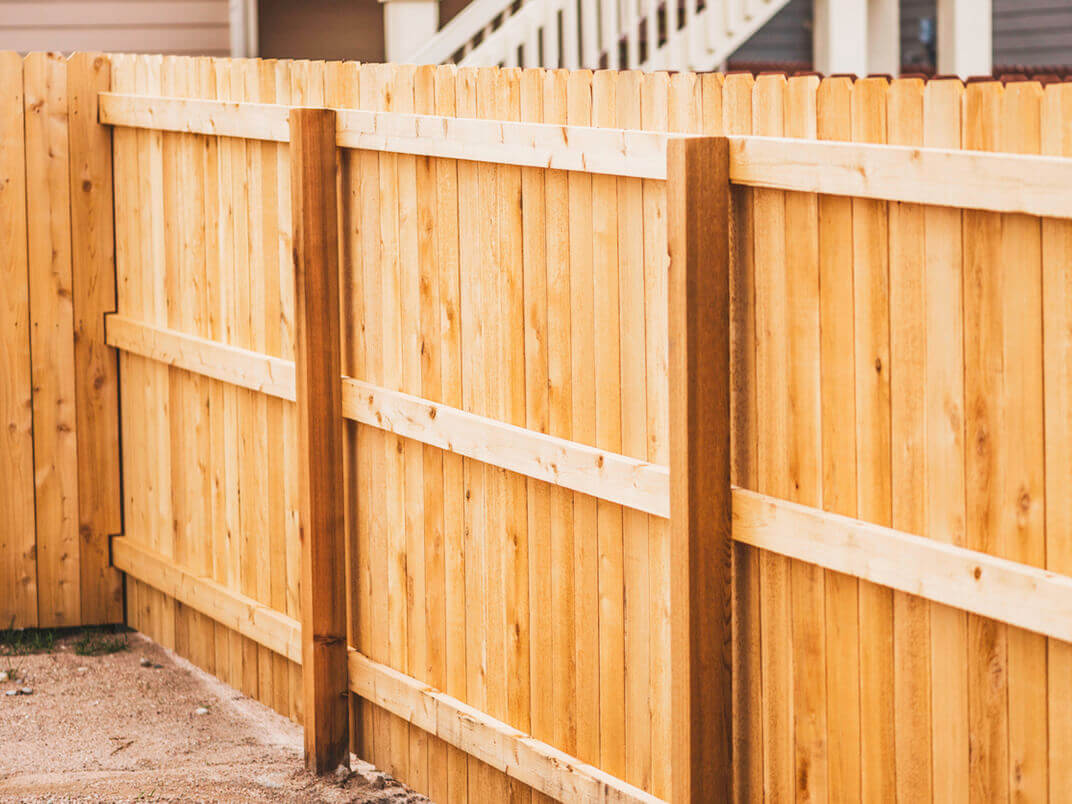Featured

When it comes to choosing the right fence product for your building, plastic, light weight aluminum, and timber are among the most popular choices. Below, we break down the benefits and disadvantages of these three typical fence materials.
Wood Fence. Pros:
Visual Charm: Wood fencings give an all-natural, traditional look that matches most sorts of landscaping and architecture. They can be conveniently personalized with paint or stain, giving you the freedom to produce the excellent color and coating for your building. Adaptability: Timber can be utilized to create a selection of fencing designs, from typical picket fencings to a lot more modern-day designs like privacy fencings or rustic ranch-style fencings. If your demands transform, it's simple to include or customize to over time. Price: Wood is generally a lot more budget friendly than vinyl or light weight aluminum, making it an appealing choice for property owners on a budget plan. The initial expense of a wood fence is generally lower than the various other products. Cons:

Upkeep Demands: Wood fencings call for routine upkeep, including discoloration, sealing, or painting to safeguard them from weathering, rot, and bug damages. Without correct treatment, wood can wear away quickly. Toughness: Timber is susceptible to harm from bugs like termites, and it can warp, split, or split gradually as a result of exposure to the elements. In locations with severe weather, wood might require to be changed much more often than other products. Restricted Life-span: While wood fencings can last for several years with correct care, they normally have a shorter life-span than plastic or light weight aluminum fences. Plastic Secure fencing. Pros:
Low Maintenance: Among the greatest advantages of vinyl fence is its reduced maintenance requirements. Unlike timber, plastic does not require to be painted, discolored, or sealed. It's immune to fading, fracturing, or warping, making it perfect for homeowners that want a hassle-free fence. Toughness: Vinyl fences are immune and very durable to the components, including UV rays, rainfall, and humidity. They're also unsusceptible insects, such as termites, that can harm wood fencings. Range of Styles: Plastic fences been available in a vast variety of designs and colors, and numerous simulate the look of timber without the maintenance drawbacks. You can pick from privacy fences, picket fences, and even more to fit your needs. Long Lifespan: With proper treatment, vinyl fences can last decades, much longer than timber fences, and they come with guarantees that provide tranquility of mind. Cons:
Greater First Expense: While plastic fencings can save money on upkeep for many years, they have a tendency to have a higher upfront cost than wood fencings, which may be a deterrent for some customers. Limited Customization: While vinyl fences are available in a variety of shades and designs, they do not have the customization flexibility that wood supplies. You're limited to the pre-designed panels offered, which may not fit every distinct visual. Potential for Fracturing in Cold Climates: In extreme chilly temperatures, plastic fencings can end up being fragile and may crack under influence, making them much less suitable for areas with freezing winters. Aluminum Secure fencing. Pros:
Resilience and Strength: Light weight aluminum is a light-weight yet strong product that resists rust and corrosion, making it suitable for seaside locations or places with high moisture. Aluminum fencings require minimal upkeep and can withstand the elements for years. Aesthetic Charm: Aluminum fencings supply a smooth, modern-day appearance. They are available in a range of ornamental designs and can be made use of to create a much more modern or sophisticated seek your residential or commercial property. Reduced Upkeep: Light weight aluminum fences do not need paint or securing, and they're immune to rust and deterioration, making them unbelievably low upkeep over time. Protection: Light weight aluminum fences supply a greater degree of safety and security compared to plastic or timber fences due to their sturdy building. They can be furnished with entrances and locks to offer a secure boundary around your property. Disadvantages:

Price: Aluminum fences are frequently much more expensive than timber or vinyl fences, both in terms of products and setup prices. This greater rate point can be a disadvantage for budget-conscious property owners. Much Less Privacy: Light weight aluminum fences usually have an even more open design, with pickets spaced apart to permit exposure via the fence. This may not be the finest option for your property if personal privacy is a priority. Prone to Denting: While aluminum is rust-resistant, it can still be nicked or bent if struck with force, such as by an automobile or hefty equipment. While it won't corrosion, it might not maintain its pristine look if it obtains damaged. Which Product is Right for You? Choosing the finest fencing product depends on your specific requirements, spending plan, and long-lasting plans for your home. On the various other hand, if you require a long-lasting, protected fencing with a streamlined appearance, light weight aluminum might be the ideal material for you.
Ultimately, consider your environment, upkeep choices, and aesthetic wishes when selecting your fence product. Each alternative has its staminas and weak points, yet with the right care and installment, all 3 can offer reputable and eye-catching borders for your residential property.
Latest Posts
Discover the Top Auto Repair Coupons in Montclare, Chicago
Published May 19, 25
1 min read
Don’t Miss Exclusive Auto Repair Specials in Chicago at Montclare Auto Repair
Published May 17, 25
1 min read
Seeking Budget-Friendly Oil Change Services in St. Louis? Car-X Gets You Back on the Road
Published May 15, 25
1 min read
More
Latest Posts
Discover the Top Auto Repair Coupons in Montclare, Chicago
Published May 19, 25
1 min read
Don’t Miss Exclusive Auto Repair Specials in Chicago at Montclare Auto Repair
Published May 17, 25
1 min read
Seeking Budget-Friendly Oil Change Services in St. Louis? Car-X Gets You Back on the Road
Published May 15, 25
1 min read